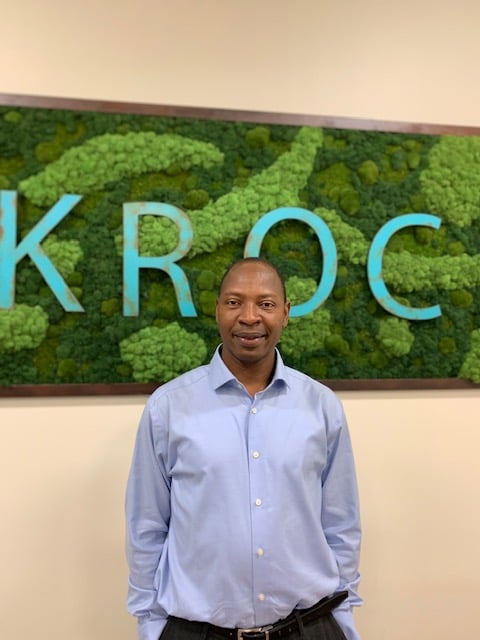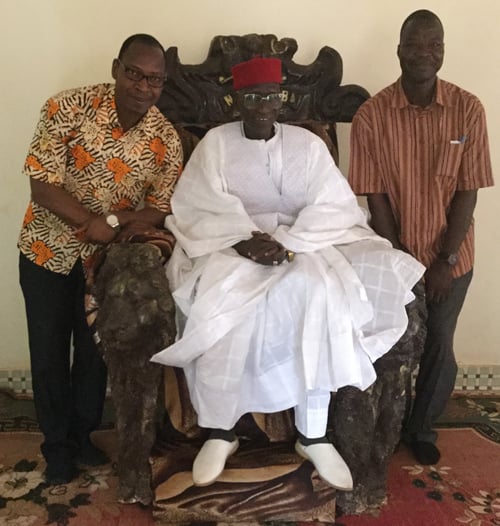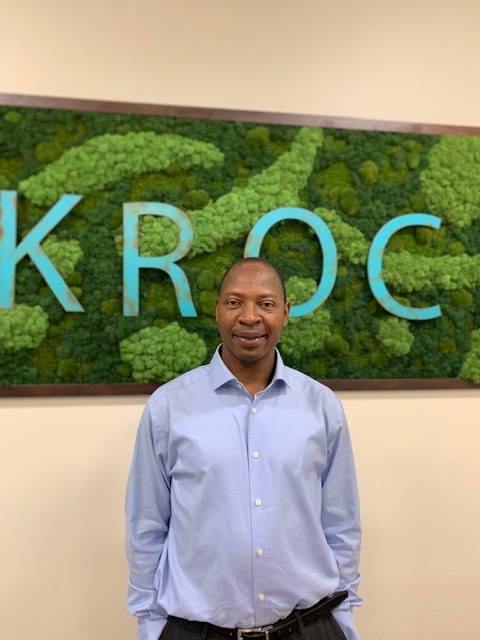Kroc School Alumnus Mathieu Bere on the Value of a Peacebuilding Perspective

In August 2019, we had the pleasure of catching up with one of our esteemed Master’s in Peace and Justice (MAPJ) alumni, Mathieu Bere ’15 MA, who graciously answered our questions regarding his path to the Kroc School, and how he has been working to build more peaceful and just societies since his graduation.
What was the path that led you to the Kroc School?
My interest in international peace and conflict management originates from experiences that I had back in Africa, especially among refugees in conflict zones. I volunteered with the Jesuit Refugee Services (JRS) during the summers of 2004 and 2006, each time for one or two months. During these “internships”, I helped to serve internally displaced people and refugees from the Darfur region in Eastern Chad, and, in 2006 within the Urban Program of the JRS in Kampala, Uganda, I served refugees and asylum seekers from the Horn of Africa and the Great Lakes region.
I also visited several refugee camps, one for refugees from South Sudan in Northern Uganda in 2006, and another in 2017 at Goudebou in Burkina Faso that has been set up for refugees that have fled terrorist violence in Northern Mali. So, I witnessed firsthand the consequences of armed conflict in Africa.
And beyond humanitarian assistance, I wanted to do something to contribute to address the root causes of the armed conflicts that tear apart and destabilize several African countries. This was, in short, what brought me in 2014 to the Kroc School. What I found particularly useful in this school is its interdisciplinary and practice-oriented programs that deal with a diversity of issues related to armed conflict and human security around the world.
What are a few key skills and/or lessons you gained during your time at the Kroc School?
The Kroc school gave me theoretical knowledge and practical skills to analyze, understand, and explore options for dealing with violent conflicts that oppose groups or nations. More specifically, I learned to view and understand conflicts from a broader, interdisciplinary perspective, taking into account human rights, economic development, political and religious aspects involved in such conflicts. And, at the practical level, I acquired basic project management skills that I sharpened when I went to the field working with USAID on democracy, governance, and counter-terrorism projects in West Africa.
What was one highlight of your Kroc School experience?
After taking a course titled “Understanding the International System” in the second semester of my time at the Kroc School, I was offered the opportunity to attend an intensive summer study of the U.N. system at the U.N. headquarters in New York. Beyond what people usually think or say about the U.N. without really knowing it, the participants (from the United States and other countries) were given the privilege to talk and interact directly with experts and staff members at the U.N. on various topics (peacekeeping, global warming, climate change, WMD, decision-making, etc.). We listened to various speakers share their experiences, their pains and joys, their worries and hopes for humanity and for our planet. They were telling us with concrete examples from around the world how the international system works, and how hard it often is to get things done and secure compliance with international regulations. It is always a challenge to promote the global common good and at the same time accommodate particular national and private interests.
This U.N. seminar is a moment that I will always remember, as it shaped my way of viewing international affairs and how, within the framework of the U.N., member states try to grapple with global challenges with little funding and limited political leverage. When working for peace, from the experience of others that I read or listened to and from my own little experience, I realized that we set out for a pilgrimage, a journey towards a promised land that we may not see, just like Moses in the Bible. But beyond our failures and frustrations in trying to achieve peace, which does not depend only on our goodwill, we find some consolation as we also realize that things would be worse if nothing was done. To paraphrase former U.N. Secretary General, Dag Hammarskjold talking about the U.N., our efforts may not bring people to paradise, but it may help spare them from hell. It is our responsibility to do what we can and let God do the rest.

Mathieu Bere, left, stands with the King of Yatenga — one of the kingdoms of the Mossi Empire — during a field trip with USAID colleagues for a countering violent extremism project in 2018.
What are you doing now in your career, and how has a Master's degree helped you with that?
After completing my Master’s at the Kroc School – I did the fast track 12 months program because I already had a Master’s degree — I was about to fly back to my home country in September 2015 when I was told that the airport where I was expected to land was closed to international flights because there was a failed coup against the transitional government and the situation was still uncertain. But I flew back home when the airport was re-opened because I said to myself: “I had come to the United States to learn more about peacebuilding and conflict resolution, for I thought that there was some wisdom to borrow from the United States and the Western world in general in this field. So, I will go home and try to help as much as I can.”
When I returned home, I worked first as a consultant with some civil society organizations, and then as a project development/peace and governance specialist at USAID on several projects that were designed to promote democratic governance and human rights, or to prevent or counter violent extremism. (Groups affiliated with Al Qaeda and ISIS have intensified their activities in the Sahara-Sahel region this last decade.) In that position, I had the opportunity to collaborate with a wide range of actors: people at the grassroots, local civil society actors, government officials, international organizations, and representatives of foreign countries. It was challenging but, at the same time, a great learning experience.
My training at the Kroc School had prepared me to map and navigate conflict situations by quickly analyzing their causes, the complex relationships between the actors, the interests at stake, and the values or security dilemmas involved — before helping the stakeholders explore options for intervention. This way of reacting to conflict helped me make insightful contributions to activities that I participated in and meetings that I attended. In conflict-ridden societies, people tend to focus only on some aspects or drivers of the conflict. One makes a great difference by helping them to envision things more broadly and explore alternative ways of understanding and dealing with the conflict that they never imagined.
More recently, I have tried to contribute to a better understanding of the insecurity generated by Islamist terrorist groups in the Sahara-Sahel region of West Africa by using my field experience, some research results, and what I have learned at the Kroc school to develop a booklet — a kind of handbook of 167 pages that practitioners in the field may find helpful. Currently, I am enrolled in a doctoral program in international peace and conflict resolution at George Mason University because I felt the need to contribute to train more peacebuilders and to help people acquire conflict resolution skills that they can use in different areas of their social and professional lives.
What advice do you have for prospective peacebuilders/changemakers today who are considering getting their Master's in Peace and Justice from the Kroc School?
President Houphouet Boigny of Côte d’Ivoire liked to say that “peace is not a word, it is a behavior”, and I would add, it is a way of living and relating with others. The Kroc School provides a space, an opportunity to come together from different disciplinary, professional, and cultural backgrounds to try to understand conflict in the contemporary world and explore ways, not of suppressing conflict, but of dealing with it constructively.
I took some time away from home and from my work to have this experience and I wish that others have the same experience. After completing the program, you don’t need to do full-time work in peacebuilding or conflict resolution in an organization, but in whatever you do later, you bring an important perspective that helps people deal constructively with conflict. That is why I think that it is a good idea that the Kroc School now gives students the opportunity to have dual degrees by combining peace studies with studies in other fields such as Law and Business.
Join the Kroc School to advance on your journey as a peacebuilder, social innovator, or changemaker. Learn about our graduate programs.
Contact:
Justin Prugh
jprugh@sandiego.edu
(619) 260-7573

About the Author
The Joan B. Kroc School of Peace Studies (Kroc School) at the University of San Diego is the global hub for peacebuilding and social innovation. Founded in 2007, the Kroc School equips the next generation of innovative changemakers to shape more peaceful and just societies. We offer master's degrees in peace and justice, social innovation, humanitarian action, conflict management and resolution, and a dual degree in peace and law — programs that have attracted diverse and dynamic students from more than 50 countries. In addition to our graduate programs, the Kroc School is home to the Kroc Institute for Peace and Justice (Kroc IPJ). Founded in 2001, the Institute supports positive change beyond the classroom. Through groundbreaking research, experiential learning, and forward-thinking programs, the Kroc School and Kroc IPJ are shaping a future in which peaceful co-existence is the new normal.






